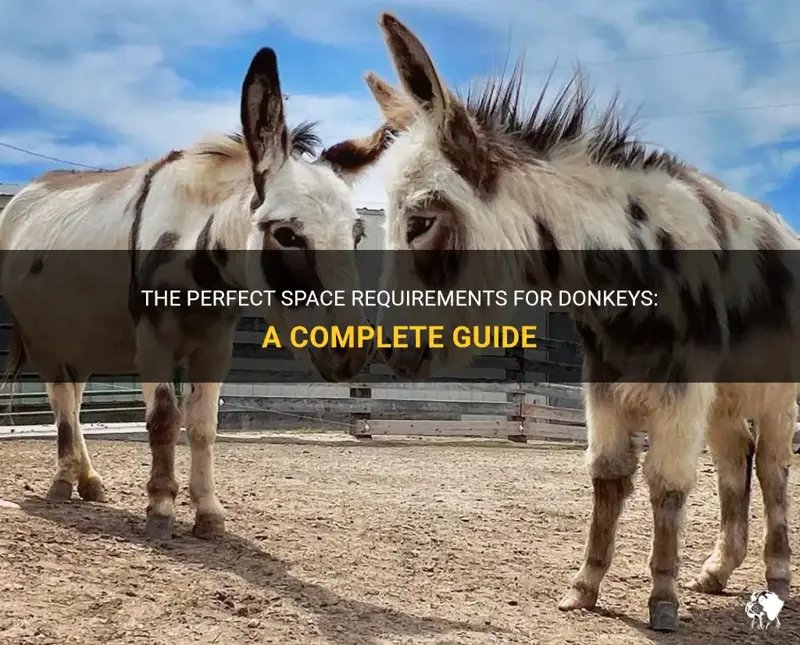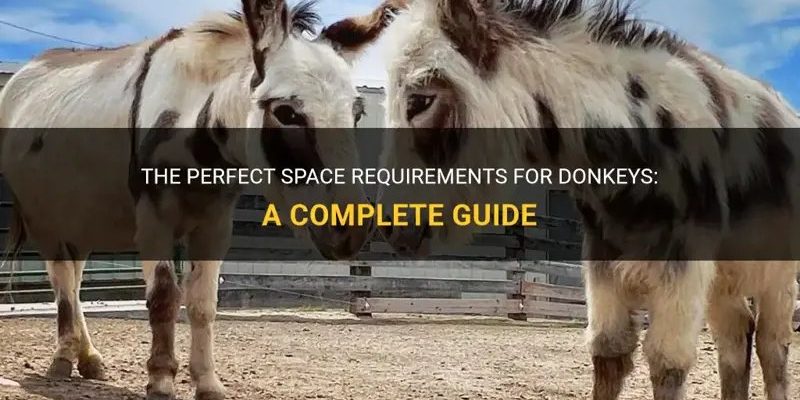
Donkeys are remarkable animals. They’re not just cute; they’re playful, intelligent, and surprisingly social. Think of them like the lovable goofballs of the animal world. But before you start dreaming about donkey picnics and leisurely hikes, you need to understand what it means to provide a comfortable home for one (or several). Whether you’re aiming to keep one as a companion or perhaps for work on a small farm, the space requirements will guide your journey.
Understanding Space Requirements for Donkeys
Here’s the thing: donkeys aren’t like dogs—they have unique space needs that stem from their natural behaviors and instincts. Ideally, you should aim for a minimum of 1 acre of land for a single donkey. But don’t worry; if you don’t have that much space, you can still accommodate a donkey successfully as long as you plan well.
Donkeys are herd animals, so keeping more than one together is crucial for their emotional well-being. If you have space for two, that’s even better! But let’s break it down.
Minimum Land Requirements
To give you a clearer picture, here’s a simple breakdown of space needs:
- 1 acre for one donkey
- 2 acres for a pair
- 3 acres for three donkeys
You might be wondering why they need so much room. Donkeys thrive on the ability to roam, graze, and express natural behaviors. Having a defined area gives them space to stay active and healthy, which is just as important as their food and water.
The Importance of Shelter
Now that you have a grasp on the land, let’s chat about shelter. Even though donkeys are robust animals, they still need protection from harsh weather. Imagine how you would feel stuck outside in the rain or scorching sun—it’s not pleasant, is it?
A simple three-sided shelter is often enough to keep donkeys safe from the elements. It should be sturdy, clean, and spacious enough for them to move around comfortably. Make sure there’s good ventilation inside, and keep fresh bedding to ensure they have a cozy spot to rest.
What to Include in Your Shelter
Here’s a quick checklist of what your donkey shelter should include:
- Enough space for each donkey to lie down comfortably.
- Good airflow to prevent humidity.
- Proper drainage to keep it dry.
- Access to fresh food and water.
Taking care of their shelter is just one part of the picture. You also need to think about how they’ll use space outside.
Pasture Management
Having the right amount of land is just the start. You’ll also need to manage the pasture effectively. This means ensuring there’s plenty of nutritious grass and forage for your donkeys to munch on. Too little space can lead to overgrazing, which can negatively affect their health and the land itself.
Let’s break this down further. Donkeys need a balanced diet, and pasture plays a big part in it. The amount of pasture you have can directly impact how healthy your donkey remains.
Pasture Rotation Practices
You might want to consider rotation grazing, which means moving donkeys between different sections of your pasture. Doing this allows grass to regrow, ensuring there’s always fresh food available. Here’s what to keep in mind:
- Rotate between two or more pasture areas to prevent overgrazing.
- Monitor grass growth and adjust the grazing schedule accordingly.
- Keep an eye on soil health; this ensures your pasture remains lush.
By managing your pasture wisely, you’re not only providing a great quality of life for your donkeys but also protecting your investment in the land.
Socialization and Companionship Needs
Donkeys are social creatures. Keeping them alone can lead to loneliness and stress. Think about how important friends are to you—donkeys feel the same way. They thrive on companionship, both with other donkeys and even with other animals like goats or horses.
If you only have space for one donkey, consider adopting two. This way, they can enjoy each other’s company, keeping their spirits high and their stress low.
Choosing Companions for Your Donkey
If you decide to bring home two, here’s how to choose compatible companions:
- Same size: Ensure they are similar in size to prevent bullying.
- Similar temperament: Pair an active donkey with another lively friend.
- Mixed species: Goats or small ponies can make great companions if space is limited.
In the end, the social aspect of donkey ownership can often be more important than the physical space. A happy donkey is one that feels secure and loved.
Legal Considerations and Zoning Laws
Before you rush to set up the ideal donkey sanctuary, check your local zoning laws. Some areas have restrictions on the number of animals you can keep or specific requirements regarding space and shelter. It’s essential to ensure that you’re in compliance to avoid any fines or issues down the line.
Contact your local animal control office or agricultural extension service to get the information you need. Knowing the law can help you make better decisions about how many donkeys you can keep and how much space you need.
Finding Reliable Resources
Seek out community resources as well. Here are some helpful places to check:
- Local extension services
- Farmers’ markets or co-ops
- Online forums or groups related to donkey ownership
Getting the right information can make a big difference in ensuring you have everything in place for your new fuzzy friend.
So, how much space do you need to keep a donkey? Ideally, aim for at least 1 acre per donkey, but remember that the quality of that space matters just as much as the size. Donkeys need room to roam, social buddies to hang out with, and a safe shelter to call home.
By understanding their unique needs and requirements, you’ll set the stage for a happy, fulfilling life for your donkey. It’s a big commitment, but with the right preparation, you’ll find that the joy they bring into your life is worth every bit of effort. Now, it’s time to start planning your donkey haven!

